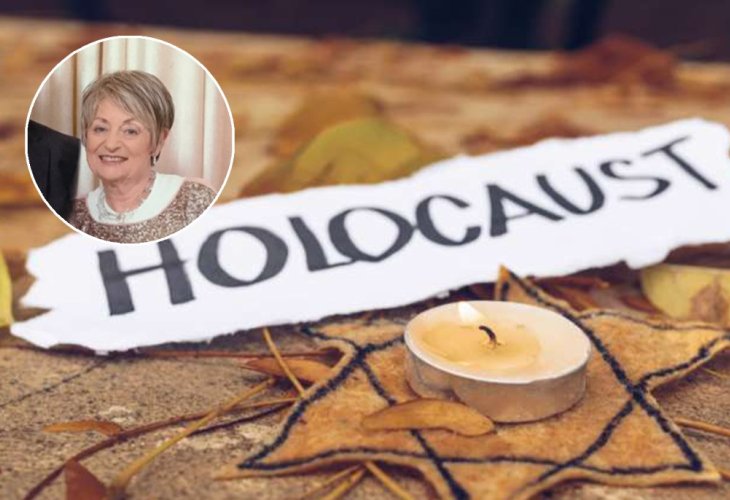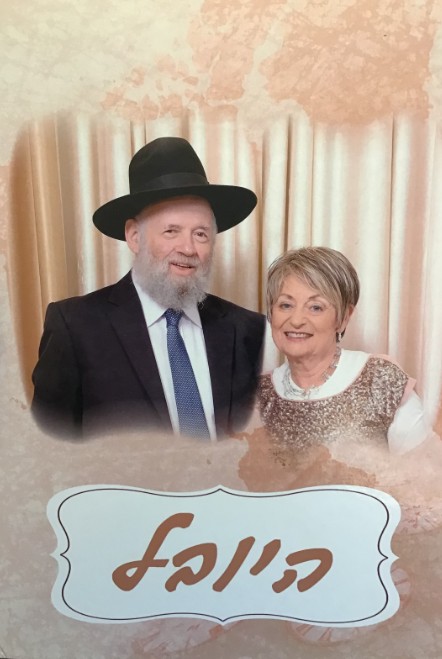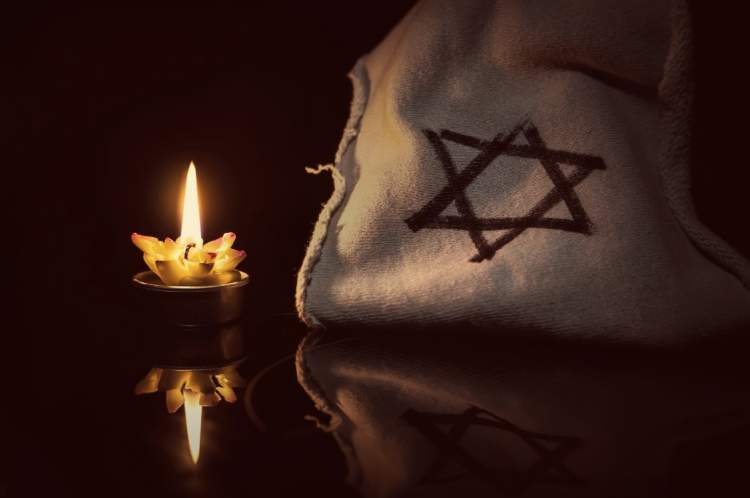Holocaust Survivor Giselle Guttel: "Suddenly One Day, Dad Disappeared"
Giselle and Liz grew up in France during World War II. Their father was taken to camps, and their mother couldn’t raise them, so they were sent to the home of Righteous Among the Nations. Mrs. Giselle Guttel shares the process, growth, and hardships.
 (Photo: shutterstock) Inset: Giselle Guttel
(Photo: shutterstock) Inset: Giselle GuttelMrs. Giselle Guttel's home is a warm one, I felt it the moment I first stepped in. The walls are filled with joyful pictures of children, grandchildren, and great-grandchildren. Holy books stand out prominently on the living room shelves. "We have a spacious apartment, a stunning view, wonderful children and grandchildren, what more could a person want? I thank Hashem every day for this," she says. "Who could have imagined that the little toddler who grew up in the farmers' house during World War II would one day establish a home and have a family?" she adds with emotion.
On Burning Ground
Mrs. Guttel invites me to sit on the couch and begins her story: "I was born in 1941 in Paris, France. My sister Liz is two years older, and we’re the only daughters in the family. My father was born in 1900 in Istanbul, Turkey. When he was 12, his family moved to Paris. My mother was born in 1905 in Lublin, Poland. Her elder sisters raised her as her mother passed away when she was young.
"My mother’s sisters moved to Paris to earn a living. In the 1930s when my mother was 25, she moved to live with her sisters because her father remarried and she didn't get along with her stepmother. Between the wars, times were hard, just as the Eiffel Tower was built, which drew tourists, some staying in France. During this period, Jews from other countries worked in simple jobs and lived in poor neighborhoods, as French Jews did not accept them. My mother worked in tailoring, as did my father.
"In 1939, the war broke out. The French surrendered quickly, and by early 1940, the Germans arrived in France. In 1942, the pro-German French police decided to cooperate with the Germans, rounding up as many Jews as possible to get rid of them. On one night, thousands of Jews were gathered in a giant stadium in Paris under horrific conditions - without food, water, or air. From there, everyone was taken to Auschwitz. That night was called 'Vel d’Hiv'. Conditions in Paris became unbearable; no one knew who was against whom, and everyone was suspicious. There were non-Jewish citizens who gave Jewish names to the government, so it was impossible to know who to trust. Sadly, there were cases where Jews themselves reported Jewish names. This is where my life story begins."

Unanswered Questions, Unfilled Gaps
"In 1943, my father was taken to Auschwitz," continues Mrs. Guttel. "I was then two and a half years old, and life started to become hard. It was difficult for my mother to raise two young daughters without food and under poor conditions, so she turned to a Jewish organization in France, whose goal was to hide Jewish children in non-Jewish homes - the organization is called OSE. Liz and I were sent to a family living in a village in central Paris. The father in that family was in captivity. The mother, grandmother, and children lived there. The village had farm animals—chickens, rabbits, and pigs. We landed there in total shock. In this village, there were other families hiding Jewish children. Some treated them appallingly and turned them into slaves. Although the families received payment for hiding them, they risked a lot. If caught, they faced severe punishments and even death."
Do you remember this?
"No, nothing. My sister remembers a little. The OSE organization people visited us, and according to the documents, they claimed we were treated well. But when the mother was pregnant, we were a little neglected. It was also recorded that my sister had a hard time letting go of the cross..."
How long did you live there?
"For two years. My mother told us that towards the end of the war, she found us one day on the steps outside her home - I was six and Liz was eight. Mother spoke Yiddish, and we did not; she knew basic French, so our conversations were very superficial.
"During the war, mother simply tried to survive. I don’t exactly know how; she almost died of hunger and cold. It was very hard for her, but she survived. During that time, people began returning to Paris, and we started hearing more and more information about the camps, the Holocaust, and the war. Everyone who returned advertised their names in synagogues and city halls. Every week, we went with mother to check if dad's name appeared, and every week we got disappointed again. Dad didn’t return. Mother began to understand she was alone and needed to make a living too. School hours in France were 9:00-12:00 - and 14:00-16:00, so mother couldn’t both work and send us to school. Additionally, her mental state wasn’t stable enough to raise us."
 (Photo: shutterstock)
(Photo: shutterstock)
"No Mother to Give You a Kiss"
Mrs. Guttel notes her mother had no choice. "Mother turned to the Jewish organization OSE again. After the war, the organization gathered orphaned children, concentrated them in palaces rented from the state, and established orphanages. We were almost the only ones with a mother; most had no parents at all, not to mention relatives. Until we arrived and settled in the orphanage, we went through several orphanages. I particularly remember one, located in western France, by the sea".
Mrs. Giselle tells me in present tense as if we’re experiencing the moment together: "I’m sick with mumps, actually, several children in the same room are sick with mumps. We are kept in a room for weeks, so we don’t infect anyone. We are in quarantine until fully recovered".
Mrs. Giselle smiles at me calmly again and focuses mainly on the story: "We settled in an orphanage near Paris. From age six to eighteen, I was in an orphanage. Since most children didn’t have parents, they allowed parents to visit once every two weeks on Sundays. My mother brought us candies. We were so embarrassed because we weren’t like everyone else. We received a good education, we were in a religious orphanage, the food was kosher, there was a Shabbat prayer. The orphanage director who dedicated himself to the children told us the weekly Torah portion. But we went to a non-Jewish school, we were called 'the palace children'. Even on Shabbat, we went to school without writing."
Dreams Help Overcome Challenges
How were the conditions in the orphanage?
"Tough. They were very strict with us. We were ten girls in a room, there was no privacy. There were nights I woke up terrified from the hardship and longing, and there was no one to comfort me. No mother to give you a kiss. There were children who wet the bed at night, I was among them. If they discovered I wet the bed - they sent me outside, there was a garden near a lake. I had to wash the sheets in the lake, in the cold dark French morning, alone. They didn’t allow my sister to help me. They stopped this punishment after a while because they saw it didn’t help. When I grew up, I understood they just wanted to help me. These were people who wanted to do us good, but warmth and love were missing".
What encouraged you to keep going?
"I had dreams. I was a dreamy child and loved to wander. Imagination helped me survive. I remember having a constant dream: 'I’ll grow up, get married, be rich, and help children in need'. We would go to school at 8:00 in the morning, in all weather. The way took about 15-20 minutes, and for me, it seemed endless. I dreamed of returning to the orphanage, with my father waiting outside in a luxurious car, and us becoming a united family. Today, I understand that dreams help overcome difficulties".
What happened at the age of 18 when you left the orphanage?
"At 18 we were told 'Goodbye' and sent to fend for ourselves. Liz and I had somewhere to land. But after all those years, living with a mother we didn’t really know was a bit complex. Liz left the orphanage first. We lived in the 20th arrondissement in Paris, a poor neighborhood full of Arabs, with shared toilet and bath for all building residents. At some point, the state decided to demolish the neighborhood, and we moved to apartments outside Paris, in Sarcelles. In the orphanage, I studied sewing, and when I left, I worked at a very prestigious fashion house in Paris. Liz immigrated to Israel, to Kibbutz Sde Eliyahu. There she married an Israeli".
Were you at her wedding?
"No, I was going through a dark period then. We corresponded a little through letters. A year later, I came to visit her when she was due to give birth. My husband is originally from France; during the war, they were in Switzerland and he came to study in Israel. In the summer, he arrived at Kibbutz Sde Eliyahu. We decided to get married and move to the kibbutz".
What enabled you to stay stable? After all, you went through challenging things.
"My mother's unconditional love and her desire for us to be well. Though she wasn't able to guide us in life, she could love, and it gave us strength and stability.
"On the other hand, mother didn’t like talking about the war at all. She even got angry when I asked her what exactly happened with dad. She simply couldn’t talk about it. When the war ended, and we were in the orphanage, we only thought about surviving, not asking questions. When we wanted to ask questions, there was no one to ask. Many questions remained in the air; gaps unfilled, I have no answers. I returned to France, told mom I was getting married, took her with me, and we moved to Israel".
How did your mother react?
"Mother was very pleased; she felt comfortable with Yiddish and the people. We got married, lived a little on Kibbutz Sde Eliyahu, our first son was born, and we moved to Givat Mordechai in Jerusalem. My husband was an architect, and I worked in tailoring. We didn’t have many means, but we managed. After four children were born, we moved to a larger apartment, with two rooms and an office for my husband".
How did you experience raising your children?
"It was very challenging. I never knew what a baby was or how to take care of one, but Hashem gave me the right instincts. Blessed Hashem, our home filled up, and today we have seven children, Baruch Hashem. Over the years, I studied parent guidance and we also strengthened spiritually, becoming more religious. The children grew up, Baruch Hashem, married good matches and established excellent homes. Every time I get emotional thinking how we survived the war - mom, Liz, and I - and now, without any evil eye, we are a big, united family. This is our joy and our victory."

